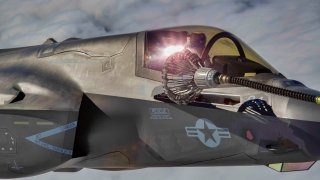U.S. Marine Corps Boosts Cyber Defense in Face of China Threat
The U.S. Marine Corps is significantly enhancing its cyber warfare capabilities, particularly with an eye towards potential conflicts with China, by deploying cyber troops to strategic locations like Okinawa, Japan.
Summary: The U.S. Marine Corps is significantly enhancing its cyber warfare capabilities, particularly with an eye towards potential conflicts with China, by deploying cyber troops to strategic locations like Okinawa, Japan. This move, part of the Marine Corps Forces Cyber Command's (MARFORCYBER) new cyber rotational force concept, aims to bolster the defense of critical networks within adversaries' weapons engagement zones. Small teams of cyber experts are being integrated into units globally, emphasizing the importance of resilient, reliable networks for rapid decision-making.
Marines Deploy Cyber Troops to Key Locations Amid Rising Cyber Warfare
The U.S. Marine Corps is investing heavily in its cyber capabilities. A potential conflict with China is at the center of the Corps’ preparations.
A recent deployment of cyber troops to the most important area of operations in the world shows how the Marine Corps, and the U.S. military as a whole, are trying to limit the threat posed by Beijing’s powerful cyber capabilities.
Cyber Marines vs. China?
In March, the Marine Corps Forces Cyber Command (MARFORCYBER) deployed cyber troops to Okinawa, Japan, as part of its first iteration of a new cyber rotational force concept.
“Cyber defense is crucial, and as our capabilities continually mature, it is important that we support the warfighters and units tasked with ensuring our competitive edge throughout the globe,” MARFORCYBER commander Maj. Gen. Ryan P. Heritage said in a press release.
Under the concept, the Marine Corps deploys small teams of cyber experts to units around the world to help with their cyber defenses.
“Ensuring we have the skills and resources to maintain resilient, reliable networks to support rapid decision making at every level is at the heart of what we do. This is just another step in realizing that goal,” Heritage added.
The team included defense cyber operators. They joined Marines specializing in cyber operations and were assigned to the III Marine Expeditionary Force.
“Protecting critical networks located inside the weapons engagement zone of several regional adversaries is essential to our ability to physically and virtually maneuver. We are excited to work with MARFORCYBER on the cyber rotational force concept and look forward to the resilience and flexibility their experts can provide our force,” said Lt. Gen. William M. Jurney, commander of U.S. Marine Corps Forces, Pacific.
“As the threat to our critical cyber infrastructure evolves, it is essential that the Marine Corps be able to defend our forward deployed networks. This will be crucial to the Marine Corps’ development of the expeditionary advance basing and stand-in force concepts,” Jurney added.
Why Cyber Matters
Cyber is an increasingly important domain in warfighting. Computer network attacks, or cyberattacks, can halt the progress of a military or prevent it from putting out an effective defense.
For example, during the initial hours of the invasion of Ukraine on February 24, 2022, the Russian military and intelligence services launched a major computer network attack against Ukraine. Malware targeted the Ukrainian military’s communications in an attempt to derail Kyiv’s command and control during some of the most important moments in the war. Had the Ukrainian military and political leadership not been able to communicate with its forces or the different commands between them, Russia’s initial invasion might have had more success.
In a potential conflict with China in the Indo-Pacific, the Chinese military and the country’s Ministry of State Security would almost certainly use kinetic cyber operations to enable other military operations. As such, the Marine Corps is moving in the right direction. Bolstering cyber capabilities in the most important theater of operations is a wise move and could make a difference in a future conflict.
About the Author
Stavros Atlamazoglou is a seasoned defense and national security journalist specializing in special operations. A Hellenic Army veteran (national service with the 575th Marine Battalion and Army HQ), he holds a BA from the Johns Hopkins University, an MA from the Johns Hopkins’ School of Advanced International Studies (SAIS). He is pursuing a J.D. at Boston College Law School. His work has been featured in Business Insider, Sandboxx, and SOFREP.


